Change in Material Per Turn

This chart is based on a single playout, and gives a feel for the change in material over the course of a game.
Be the first to cross the board
Get any piece to the opponent's home row.
Pieces may move one space in any forwards direction.
This was a hard game to programme; most of the obvious heuristics didn't change the AI strength at all - which seems to rely mostly on reading ahead, rather than any sense of position. The heuristics in paper "Programming Breakthrough" by Richard Lorentz and Therese Horey helped somewhat, though I found UCT weaker than AlphaBeta overall.
General comments:
Play: Combinatorial
Mechanism(s): Race
Components: Board
Level: Standard
| BGG Entry | Breakthrough |
|---|---|
| BGG Rating | 6.46522 |
| #Voters | 69 |
| SD | 1.66645 |
| BGG Weight | 2.3636 |
| #Voters | 11 |
| Year | 2001 |
| User | Rating | Comment |
|---|---|---|
| rootbeer | 6 | A quick, fun abstract game. See my review. The comment by Robert Osvalds below is referring to a different game by the same title. |
| fxjohn | N/A | Classic game variant |
| mrraow | 9 | My preferred playing field is 7x7; I find the 8x8 board is a little too slow to get to the action by comparison. (Now implemented in Ai Ai and getting the AI to play well was a real pig!) |
| 1974vertigo2009 | N/A | PnP - 599 |
| MyOtheHedgeFox | 7 | |
| wkusau | 6 | 2 player abstracts are not my favorite but this is a solid game. |
| fogus | 5.2 | |
| Tony van der Valk | 8 | |
| megamau | 7 | Would like to play with a "real life" opponent and not only against "Zillion's of Games" |
| Aiken Drum | 5 | |
| dooz | 5 | |
| Pensator | 7 | 2 players. Abstract strategy. A little boring until middle game - end game. Later very good. |
| Nap16 | 6 | Free Print & Play. Awards: 8x8 Game Design Competition 2001 (sponsored by About Board Games, Abstract Games Magazine, and the Strategy Gaming Society). |
| molnar | N/A | will give this a try. |
| mafko | 7.5 | |
| artyomch | 7 | |
| leyton | 8 | The simplicity of purpose to Breakthrough does not preclude you from exercising those little grey brain cells and having those mental breakthroughs. A good game which uses the 8x8 game board I am still to find my feet with the game but it has been a hit with friends and though I am as yet unable to find holes in my opponents defences it is down to me rather than any flaw in the game. |
| tiagotempera | 6 | |
| bichejote | 5.5 | |
| tocoking | 4 | |
| orangeblood | 7 | Play it on Little Golem. |
| nycavri | 6 | Simple ruleset creates a very simple game. Worth a occasional play. |
| kitrok | 6 | I'm adding a variant to this, sort of like the Bombardment variant. |
| clayhaus | 9 | First play on a 9x9 board. Slow start but mechanics getting vary interesting as opposing pieces approach. Became a race in the end: breakthrough! I see lots of plays with this. |
| simpledeep | 8 | |
| schwarzspecht | 8 | |
| mhowe | 9 | |
| PSchulman | 7.5 | |
| CokaCola | 7 | |
| Aganju | 6.4 | |
| ehrensing | 5 | |
| MarkSteere | 1 | |
| tckoppang | 6 | |
| Colonnello Vincent | 7.5 | Very simple rules. Pheraps too much simple. |
| seneca29 | N/A | 8x8 16 pedine ciascuno che si muovono in Avanti o in diagonale avanti, di un passo |
| YHGan | 10 | A rare game that can reach out to every age, a fine example of "simple but deep" design, this is the game that I always use to bring people into abstract games. |
| unic | 6 | Elegant design which always progresses towards a winner - no draws, or repetitions here. I do question however whether the current setup is the best - the 'opening' phase of the game feels like it goes on to long before the action starts. Either a slightly smaller board (or possibly just less distance between the two armies) or slightly fewer pieces would mean the game could progress to an interesting point quicker. As it is now, the opening is dull. I also wish there were more opportunity to sacrifice material - in the games I've played, material always seems to remain equal until one side or the other gets a decisive breakthrough - material can then get sacrifices for a short-term immediate win, but I've never seen a sacrifice for longterm positional factors. |
| gmoralesor | 5 | valencia (go board) |
| XMJA | 5 | |
| drunkenKOALA | 9 | [url=http://www.boardgamegeek.com/forum/63/game/3825]Chess-like fun[/url] without the brain-burning workout. Reminds me of a game of rugby. |
| CarlosLuna | 9 | |
| Mingy Jongo | 8.5 | |
| AbstractStrategy | 4 | |
| CDRodeffer | 6 | I've played several times, and it's decent, if a bit slow. The first player to initiate a series of captures generally gets a tactical disadvantage, so it's often best to simply reinforce and slowly march forward. For a much better game along the same lines, try Cannon. |
| Pierre_qui_Roule | 8 | |
| pleclenuesse | 7 | |
| zabdiel | 7 | |
| kgnunn | 9 | A short, clear rules set but deep gameplay. What more--this side of the GIPF project--could you ask for in a boardgame? |
| russ | 7 | Abstract strategy game; simple rules, cross one of your pawns to the other side. |
| ceenan | 7 | |
| Kaelistus | 7 | |
| femeref | N/A | * |
| khalon | 9 | |
| scih | 6.5 | |
| BrotherScot | 8 | Handmade set... Reusing the Gounki set, really. =) |
| pulla | 7 | This feels like a better version of checkers. Why play checkers when you can play this? |
| whac3 | 5.5 | Simple but elegant See review. |
| D Beau | 6 | Unassuming game, but well-balanced, and seems deep. Lacks pizazz, but holds some interest. |
| Fenriz | 4 | Decent little abstract. Can play with a checkers/chess board and some chess pieces (or checkers pieces if you have some extras). The opening is slow, but it speed up after that. |
| Zickzack | N/A | Checkers with neither promotion nor multiple capture - reaching the back row wins the game. The pieces move like Chess pawns which allows for blockades different to Checkers. However, the combination of blockade with either zugzwang or breakthrough to follow is typical for Checkers. The original design was for 7x7. |
| BozoDel | 6 | |
| MobyNostromo | 5 | Very simple game. It's almost like reading a mild thriller on a very comfortable couch. |
| Grupo_Lisboa | N/A | Kit Jogos Ludos |
| flahr | 7 | A strong, simple abstract with a neat tension between defence and advancement. The simple clock of having to move every turn means you need to chose when to hold back cagily and develop your defensive structures and when you think you have the upper hand and can throw pieces away in order to get one pawn over the mark for victory. |
| Kaffedrake | 4 | If I understand this game correctly it is about shifting weight and surgically attacking your opponent's point of weakness. However, once you actually get to close action it becomes very tactical and not much fun. |
| ctalbot | 6 | Not bad, but the first couple of dozen turns are boring. There are better abstracts, so I won't seek out opportunities to play Breakthrough. |
| dralius | 5 | |
| _The_Inquiry_ | 5 | Prior to 2020: 1 play |
| GeorgiaHikerGirl | N/A | Downloadable rules. |
| Mosse | 4 | Have started a couple of games at www.littlegolem.net, will wait a few games before rating... |
| jefferydoc | 7 | |
| converger | 7 | |
| joegrimer | 5 | Yet another fun abstract for when you don't want to play chess. |
| glaurent | N/A | Playable using chessboard, 16 counters (X2) |
| big_buddha | 5 | It's extremely simple and offers a lot of strategy, but it just isn't as much fun for me as other abstracts |
| ChristianDK | 3 | Not a big fan of this game. It's tedious and boring. |
| halladba | 9 | |
| FiveStars | 5 | The original game (invented in 2000) was played on a 7x7 board which was just perfect. Then the game was adapted to a chess board to fit into a 8x8 Game Design Competition (to be submitted until December 2000 to Abstract Games Magazine), which resulted in a lengthy, rather boring opening. A spoiled game! |
| infomage27 | N/A | 2-player filler |
| AI | Strong Wins | Draws | Strong Losses | #Games | Strong Win% | p1 Win% | Game Length |
|---|---|---|---|---|---|---|---|
| Random | |||||||
| Rαβ + ocqBKs (t=v0.01s) | 36 | 0 | 0 | 36 | 100.00 | 52.78 | 21.47 |
| Rαβ + ocqBKs (t=v0.03s) | 36 | 0 | 14 | 50 | 72.00 | 46.00 | 43.70 |
| Rαβ + ocqBKs (t=v0.55s) | 36 | 0 | 11 | 47 | 76.60 | 70.21 | 44.36 |
Level of Play: Strong beats Weak 60% of the time (lower bound with 90% confidence).
Draw%, p1 win% and game length may give some indication of trends as AI strength increases; but be aware that the AI can introduce bias due to horizon effects, poor heuristics, etc.
| Size (bytes) | 25013 |
|---|---|
| Reference Size | 10577 |
| Ratio | 2.36 |
Ai Ai calculates the size of the implementation, and compares it to the Ai Ai implementation of the simplest possible game (which just fills the board). Note that this estimate may include some graphics and heuristics code as well as the game logic. See the wikipedia entry for more details.
| Playouts per second | 47834.30 (20.91µs/playout) |
|---|---|
| Reference Size | 1603592.05 (0.62µs/playout) |
| Ratio (low is good) | 33.52 |
Tavener complexity: the heat generated by playing every possible instance of a game with a perfectly efficient programme. Since this is not possible to calculate, Ai Ai calculates the number of random playouts per second and compares it to the fastest non-trivial Ai Ai game (Connect 4). This ratio gives a practical indication of how complex the game is. Combine this with the computational state space, and you can get an idea of how strong the default (MCTS-based) AI will be.
| 1: White win % | 52.95±0.96 | Includes draws = 50% |
|---|---|---|
| 2: Black win % | 47.05±0.96 | Includes draws = 50% |
| Draw % | 0.00 | Percentage of games where all players draw. |
| Decisive % | 100.00 | Percentage of games with a single winner. |
| Samples | 10371 | Quantity of logged games played |
Note: that win/loss statistics may vary depending on thinking time (horizon effect, etc.), bad heuristics, bugs, and other factors, so should be taken with a pinch of salt. (Given perfect play, any game of pure skill will always end in the same result.)
Note: Ai Ai differentiates between states where all players draw or win or lose; this is mostly to support cooperative games.
Rotation (Half turn) lost each game as expected.
Reflection (X axis) lost each game as expected.
Reflection (Y axis) lost each game as expected.
Copy last move lost each game as expected.
Mirroring strategies attempt to copy the previous move. On first move, they will attempt to play in the centre. If neither of these are possible, they will pick a random move. Each entry represents a different form of copying; direct copy, reflection in either the X or Y axis, half-turn rotation.
| Game length | 43.51 | |
|---|---|---|
| Branching factor | 23.75 | |
| Complexity | 10^59.57 | Based on game length and branching factor |
| Computational Complexity | 10^6.88 | Sample quality (100 best): 56.71 |
| Samples | 10371 | Quantity of logged games played |
| Distinct actions | 228 | Number of distinct moves (e.g. "e4") regardless of position in game tree |
|---|---|---|
| Killer moves | 9 | A 'killer' move is selected by the AI more than 50% of the time Killers: a2-b1,c6-b7,e6-d7,f6-g7,g2-g1,g2-f1,a6-b7,g6-f7,a6-a7 |
| Good moves | 158 | A good move is selected by the AI more than the average |
| Bad moves | 70 | A bad move is selected by the AI less than the average |
| Samples | 10371 | Quantity of logged games played |

This chart is based on a single playout, and gives a feel for the change in material over the course of a game.

This chart shows the best move value with respect to the active player; the orange line represents the value of doing nothing (null move).
The lead changed on 50% of the game turns. Ai Ai found 4 critical turns (turns with only one good option).
Overall, this playout was 92.86% hot.

This chart shows the relative temperature of all moves each turn. Colour range: black (worst), red, orange(even), yellow, white(best).

Table: branching factor per turn.

This chart is based on a single playout, and gives a feel for the types of moves available over the course of a game.
Red: removal, Black: move, Blue: Add, Grey: pass, Purple: swap sides, Brown: other.
| 0 | 1 | 2 | 3 | 4 | 5 | 6 | 7 |
|---|---|---|---|---|---|---|---|
| 1 | 19 | 380 | 3971 | 39692 | 287033 | 2012165 | 11398302 |
Note: most games do not take board rotation and reflection into consideration.
Multi-part turns could be treated as the same or different depth depending on the implementation.
Counts to depth N include all moves reachable at lower depths.
Inaccuracies may also exist due to hash collisions, but Ai Ai uses 64-bit hashes so these will be a very small fraction of a percentage point.
No solutions found to depth 7.
| Moves | Animation |
|---|---|
| a2-b3,a6-b5,b2-a3,b6-c5,f2-e3,d6-d5,g2-f3,g6-f5,d2-c3,e6-e5 | 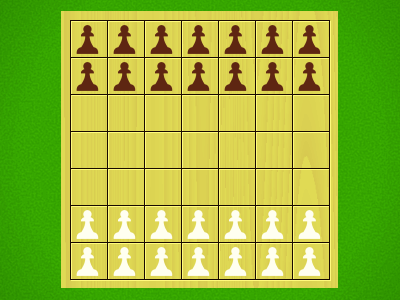 |
| a2-b3,a6-b5,b2-c3,g6-f5,e2-f3,d6-e5,f2-e3,b6-c5,b3-b4,c5-b4 | 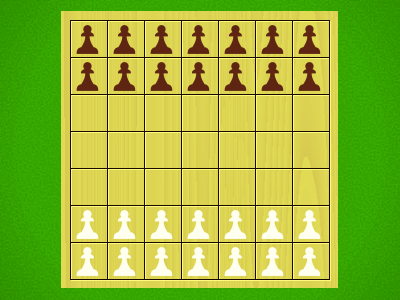 |
| a2-b3,a6-b5,b2-c3,g6-f5,f2-f3,b6-c5,d2-e3,f6-e5,c2-d3,b5-b4 | 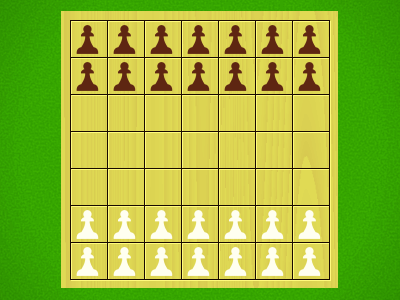 |
| a2-b3,a6-b5,b2-c3,g6-f5,f2-f3,b6-c5,d2-e3,f6-e5,e2-d3,b5-b4 | 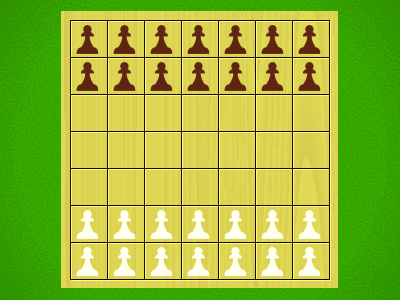 |
| a2-b3,a6-b5,b2-c3,g6-f5,f2-f3,b6-c5,e2-e3,c6-d5,c2-d3,e6-e5 | 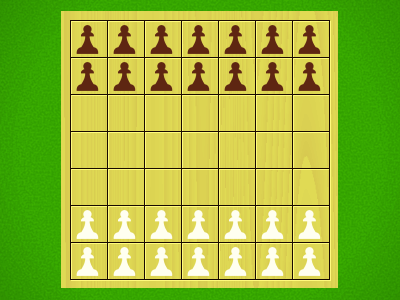 |
| a2-b3,a6-b5,b2-c3,g6-f5,f2-f3,b6-c5,e2-e3,c6-d5,c2-d3,f6-g5 | 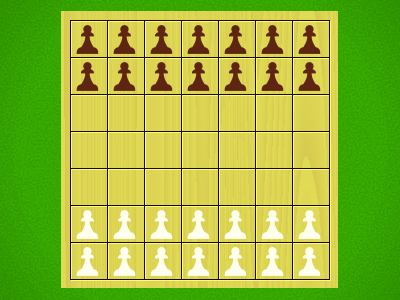 |
| a2-b3,a6-b5,b2-c3,g6-f5,f2-f3,b6-c5,e2-e3,c6-d5,c2-d3,f6-e5 | 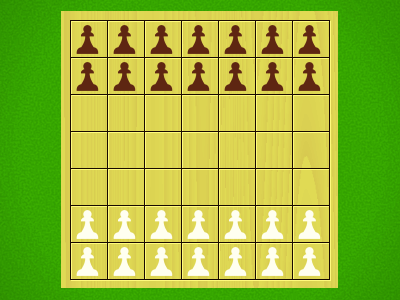 |
| a2-b3,a6-b5,b2-c3,g6-f5,f2-f3,b6-c5,e2-e3,c6-d5,g2-g3,f5-e4 | 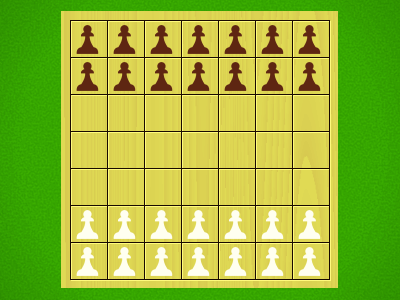 |
| a2-b3,a6-b5,b2-c3,g6-f5,f2-f3,b6-c5,e2-e3,d6-e5,b3-b4,c5-b4 | 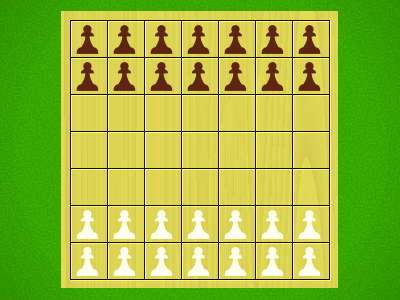 |
| a2-b3,a6-b5,b2-c3,g6-f5,f2-f3,b6-c5,e2-e3,f6-e5,d2-d3,b5-b4 | 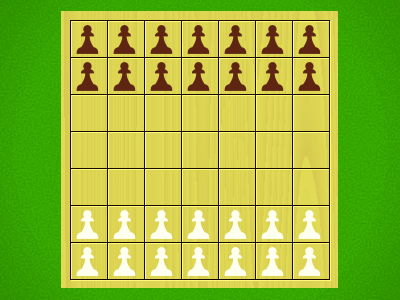 |
| a2-b3,a6-b5,b2-c3,g6-f5,f2-f3,c6-c5,d2-e3,d6-e5,c3-c4,b5-b4 | 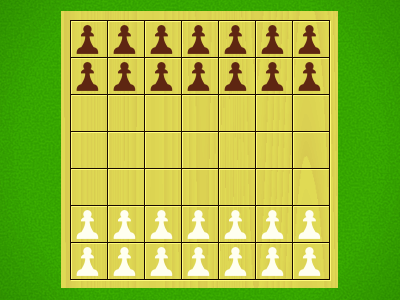 |
| a2-b3,a6-b5,b2-c3,g6-f5,f2-f3,c6-c5,d2-e3,d6-d5,c2-d3,e6-e5 | 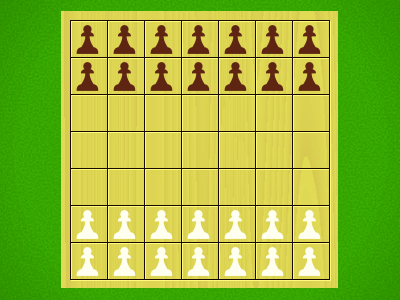 |
| Puzzle | Solution |
|---|---|
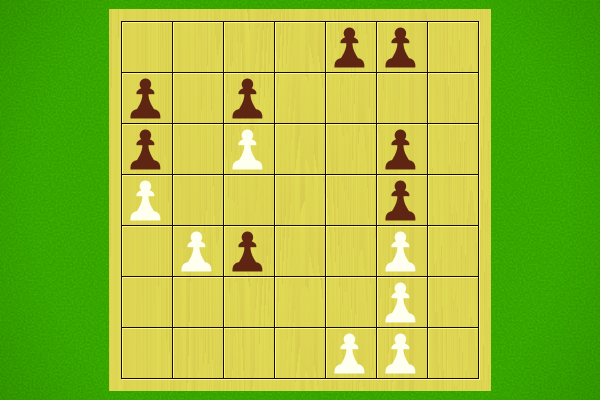 White to win in 3 moves |
Selection criteria: first move must be unique, and not forced to avoid losing. Beyond that, Puzzles will be rated by the product of [total move]/[best moves] at each step, and the best puzzles selected.